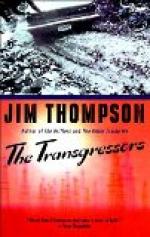The prospects of the coming election look dubious for the people. On August thirteenth the Committee of Forty determined to take the step for re-emancipation. The time to strike the telling blow at monopoly is approaching. The men all know what the work outlined will entail, and they have brought themselves to look at the matter in much the same light as the originator of the unparalleled expedient.
“We have been forced into adopting the plan of annihilation,” Professor Talbort declares to Henry Neilson, a fellow committeeman with whom he is traveling to the Pacific coast.
“I agree with you,” replies Neilson, “it is the only course open to us; we have given every other proposal careful consideration. They would only temporarily avert a conflict.”
“I have pondered on the question of how our acts will be accepted by the people,” the Professor resumes. “I believe they will hail our acts as those of deliverance.”
“They will appreciate that we gave our lives for them,” Neilson declares unhesitatingly.
All of the Forty act with similar coolness.
Men of action are not as a usual thing great talkers; so it is with the members of this committee. They waive much that would be deemed essential by less resolute and active men. How the several annihilations are to be effected is a matter left for each man to decide for himself. He will have to carry out any plan he devises, and it is considered as the best policy to let his method be known to no one else. This is the surest way of avoiding a possible miscarriage of the plan.
The failure of one of the forty men will not then involve the remaining thirty-nine. Every contingency is weighed. The chance of one or more of the men going insane because of the frightful secret, is taken into account and the idea that each man shall decide the details of the course he is to pursue is adopted.
“I am glad that we parted without formality,” Nettinger declares to the group of committeemen who are his companions on a train that leaves Chicago for the South.
“It would have unnerved us to speak of our meeting as ‘the last’” says another of the group. “I have faced danger in my life, but I regard this as the most astounding departure that has ever been made in the interests of humanity.”
“The future of the Republic is at stake,” observes a third. “How will it all end?”
This is the question that is uppermost in the minds of all.
“There is no time left to weigh the effects of defeat,” Nettinger asserts. “Each of us has but one thing to do, and to do this successfully he has pledged his life. No man can do more.”
The eleven disciples, as they separated after the crucifixion, each to pursue a separate course, inaugurated the preaching of a great and potential religion, and their work is the most momentous in history. So it may prove that this Nineteenth Century aggregation of men united for the purpose of benefiting their fellowmen, is of tantamount influence on the human race.




